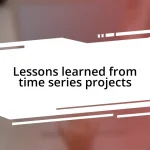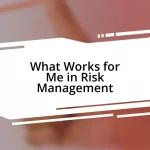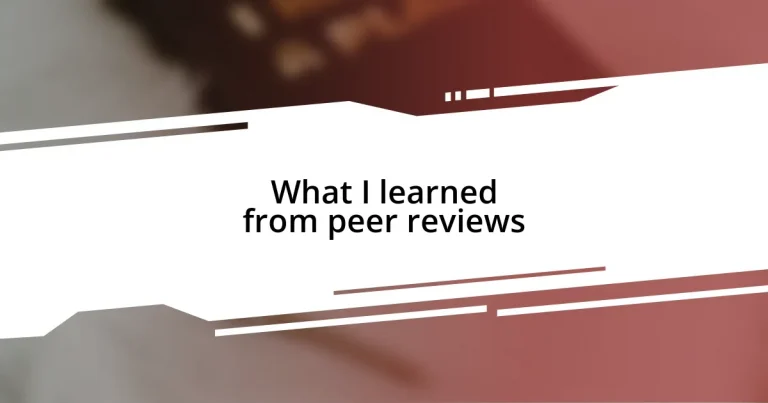Key takeaways:
- Peer reviews foster growth by providing diverse perspectives that enhance understanding and creativity.
- Constructive criticism is essential for clarity and can improve communication skills; it should be framed as a dialogue for better collaboration.
- Effective feedback requires specificity and a focus on strengths to create a supportive environment and encourage growth.
- Embracing and applying feedback builds resilience and confidence, turning vulnerability into strength.
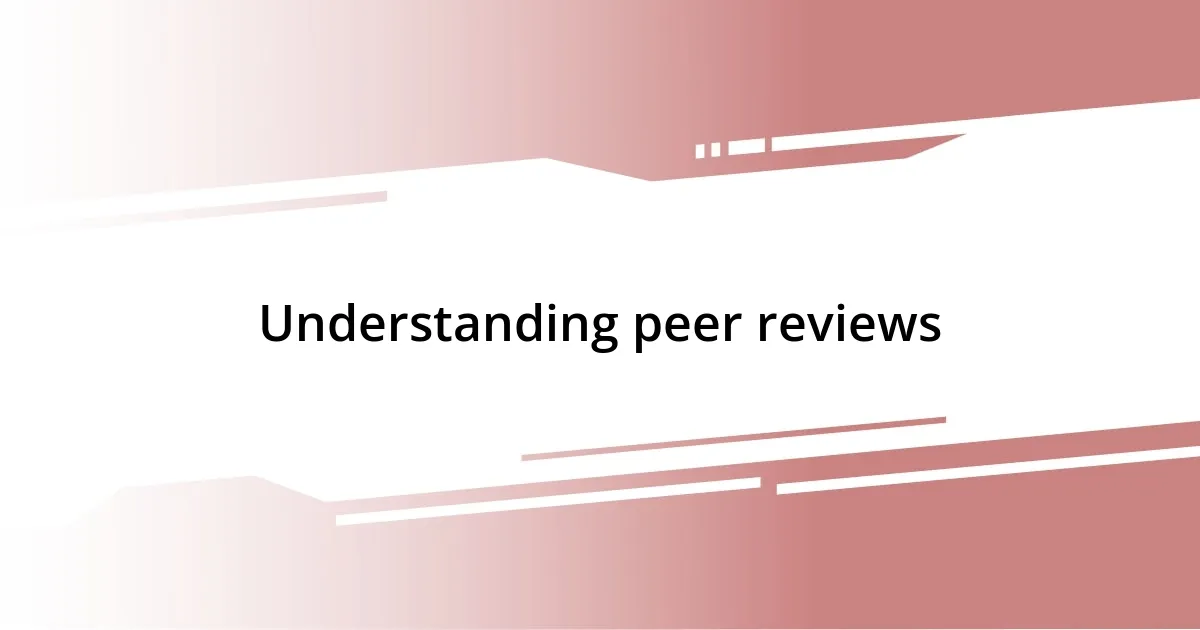
Understanding peer reviews
Peer reviews are more than just a formal critique; they’re a vital part of growth in any field. I remember my first experience receiving feedback from a colleague. Initially, I felt vulnerable, wondering if my work would stand up to scrutiny. But that discomfort quickly transformed into motivation when I realized how valuable their insights could be.
Navigating through peer reviews can feel daunting, yet it’s an opportunity to gain a fresh perspective. Have you ever considered how another person might interpret your work differently? I’ve found that sometimes, those differing viewpoints can unveil angles I had completely overlooked, igniting a spark for further creativity in my projects.
Understanding peer reviews also means embracing a culture of constructive criticism. I still recall a time when a peer pointed out that my argument lacked clarity. At first, it stung, but that moment taught me the importance of clarity in communication. It’s about building each other up, ultimately leading to stronger, more refined work that we can all be proud of.
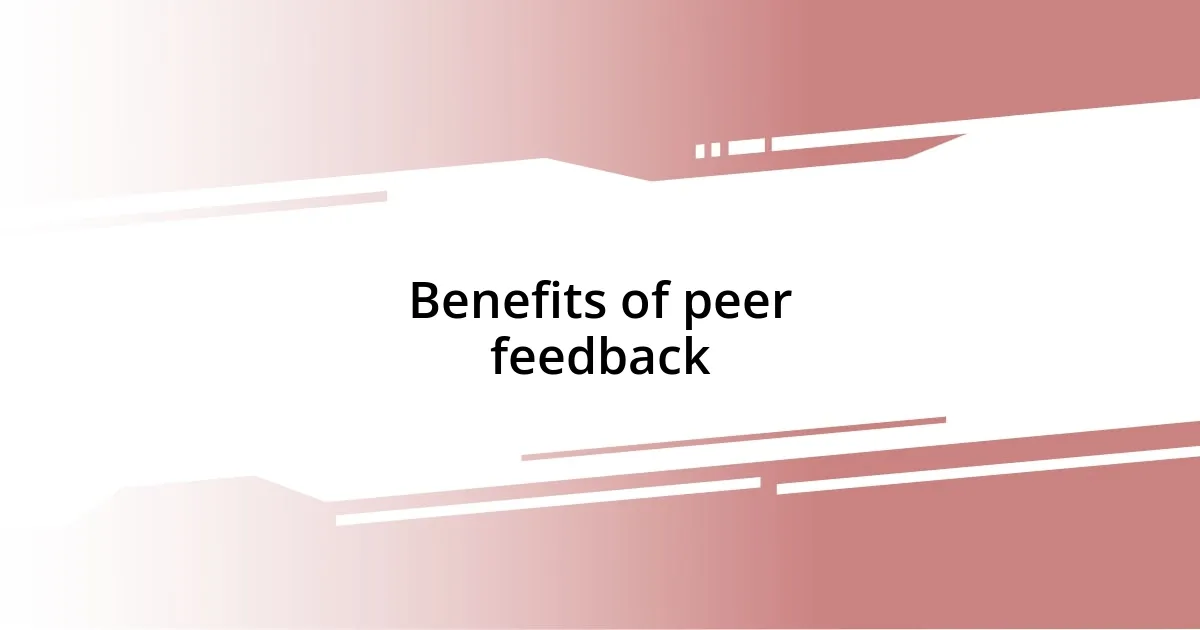
Benefits of peer feedback
Receiving peer feedback has transformed how I approach my work. The tremendous advantage comes from being exposed to diverse viewpoints, which can often illuminate flaws or strengths I hadn’t noticed. I remember a time when a colleague’s thoughtful critique on my presentation style not only enhanced my delivery but also increased my confidence. It’s fascinating how someone else’s experience and perspective can refine our thinking and growth.
Here are some key benefits of peer feedback:
– Enhanced Learning: Engaging with constructive criticism helps us to view our work through a different lens, fostering deeper understanding and learning.
– Increased Accountability: Knowing that others are reviewing your work can motivate you to maintain a higher standard.
– Skill Development: Continuous exposure to peer insights hones critical analysis and communication skills, which are vital in any professional setting.
– Confidence Building: Over time, receiving and acting on feedback can bolster your self-esteem by validating your efforts and growth.
– Collaboration: Constructive peer feedback nurtures a collaborative culture, encouraging teamwork and shared success.
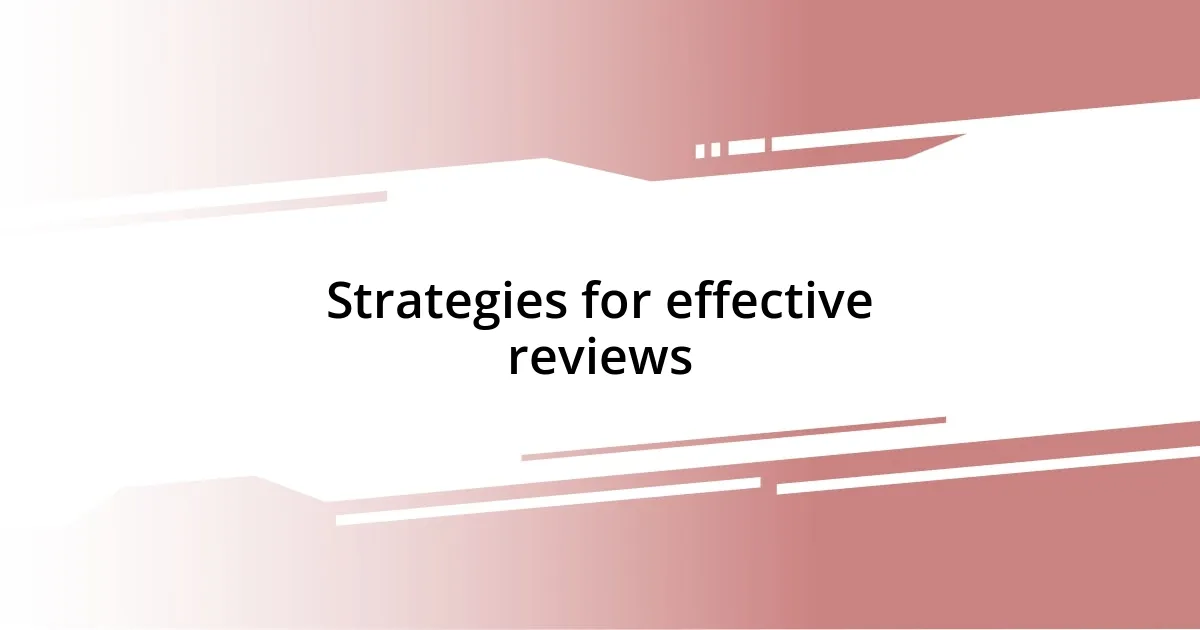
Strategies for effective reviews
When I review someone else’s work, I find that reflecting on their strengths first makes a world of difference. I recall a time when I started a review with a compliment about the unique angle they had taken on a topic. This approach not only made the recipient more receptive to feedback but also encouraged a positive atmosphere. I realized that highlighting what someone does well can pave the way for suggesting improvements without making them feel defensive.
Effective peer reviews also hinge on specific feedback. Vague comments like “this isn’t great” don’t help anyone grow. Once, a colleague told me to pinpoint my favorite section while suggesting improvements. This tip allowed me to articulate my thoughts better, making it easier for others to understand my perspective. The more detailed your feedback, the greater the chance of creating actionable insights for improvement.
One strategy I’ve embraced is to ask open-ended questions during reviews. I once posed a question about a design choice a colleague made, prompting an engaging discussion about their thought process. This not only deepened my understanding but also encouraged my peer to think critically about their decisions, leading to a more insightful dialogue. Creating a space for such conversations transforms a simple review into a collaborative learning experience.
| Strategy | Description |
|---|---|
| Start with Strengths | Begin by highlighting what the peer did well to create a positive atmosphere. |
| Be Specific | Provide detailed, concrete feedback instead of vague comments. |
| Ask Open-Ended Questions | Encourage critical thinking by asking questions that prompt discussion. |
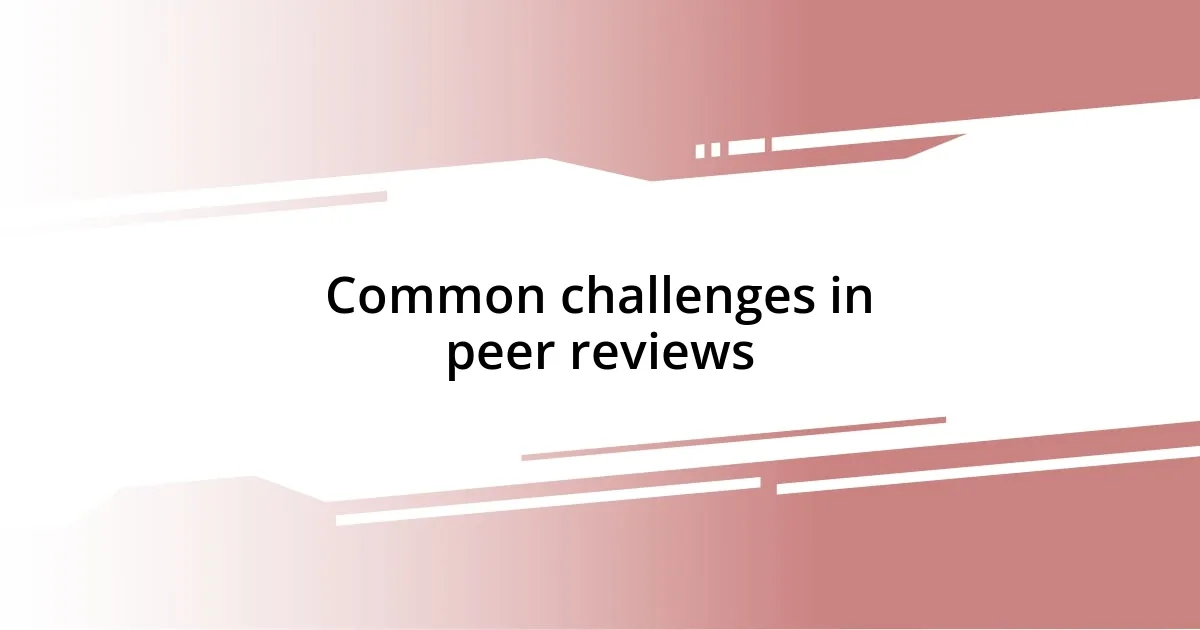
Common challenges in peer reviews
One common challenge in peer reviews is the difficulty in delivering honest feedback without hurting feelings. There was a time when I had to assess a friend’s project that I thought missed the mark. I remember feeling torn between being truthful and preserving our friendship, which made me reflect on the importance of framing criticism constructively. Have you ever been in a similar situation? I realized that emphasizing improvement rather than focusing solely on flaws can help maintain a supportive environment.
Another hurdle I often encounter is the variation in expertise among peers. I’ve noticed that not everyone brings the same level of knowledge to the table, which can lead to miscommunications. For instance, during a collaborative project, I received feedback from someone less experienced in our field, and it left me confused as to how to proceed. It dawned on me that we need to establish a baseline of understanding before diving into reviews to ensure everyone is on the same page.
Lastly, time constraints can significantly impact the quality of peer reviews. I’ve had moments when I rushed through feedback just to meet a deadline, and the results were less than satisfactory. It made me wonder, how can we balance thoroughness with efficiency? I’ve learned that setting aside dedicated time for reviews, even just a short period, can lead to more meaningful insights and a greater sense of accountability in the collaborative process.
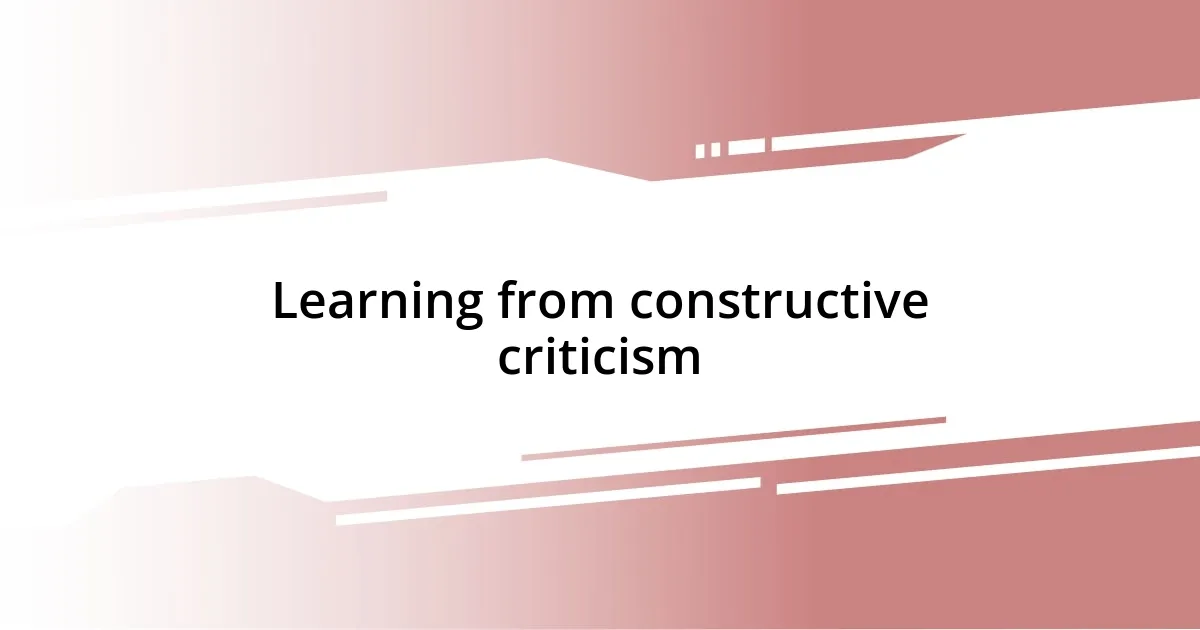
Learning from constructive criticism
Learning from constructive criticism is an often-underestimated opportunity for growth. I remember a time when I received feedback that left me feeling a little bruised, but as I sat with it, I realized that there was a treasure trove of insights beneath my initial defensiveness. It’s so easy to take criticism personally, but when I shifted my mindset, I discovered that the goal was improvement, not judgment. Have you ever felt that sting of criticism, only to find that it pushed you to become better?
There’s something liberating about embracing the perspective of your peers. I once received a comment that suggested I was overly complex in my explanations; it felt harsh, yet it compelled me to simplify my writing. I started to see it as a pathway, instead of a barrier, to clearer communication. The experience taught me that constructive criticism can be a guide—pointing out areas where I might be complicating things unnecessarily. Isn’t it fascinating how someone else can highlight a blind spot you didn’t even know existed?
Ultimately, I’ve come to appreciate that constructive criticism is a dialogue, not a monologue. I once engaged in a review where my peer and I bounced ideas off each other, transforming what could have been a simple critique into a rich exchange of thoughts. We debated, laughed, and ultimately improved our work together. I’ve learned to view feedback as an invitation to collaborate. Can we frame criticism as a conversation rather than a confrontation? This mindset shift not only enhances my work but also deepens my relationships with colleagues.
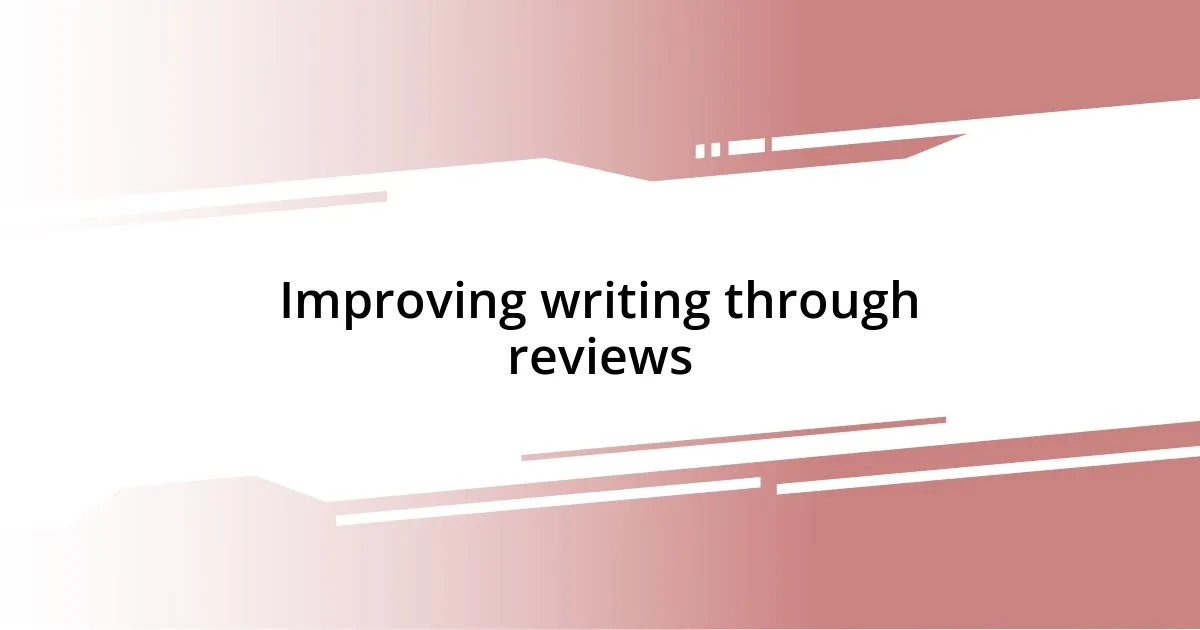
Improving writing through reviews
Receiving peer feedback can be a transformative experience for honing one’s writing skills. I vividly recall a time when a colleague pointed out my heavy use of jargon, which was a blind spot for me. At first, I felt defensive; after all, I was proud of my technical knowledge. But, when I took a moment to breathe, I realized that simplifying my language could actually help me connect better with my audience. Have you ever thought that something you love could be a barrier instead of a bridge? That shift in perspective allowed me to revitalize my writing style and engage readers on a deeper level.
Another aspect to consider is how peer reviews enhance clarity. I distinctly remember receiving feedback that my argument needed more structure. At first, I brushed it off, thinking my points were clear. But after revisiting my work through a fresh lens, I understood my peer’s suggestion. I started dissecting my ideas more thoroughly and outlining my arguments, which made my writing flow effortlessly. Doesn’t it make you wonder how others’ insights can reveal what you’re too close to see?
In the end, embracing peer reviews has taught me the value of perspective. There was a project where feedback prompted a complete rewrite of my introduction, and I hesitated initially. Yet, when I allowed myself to embrace that feedback, the final product felt so much more powerful. It pushed me beyond my comfort zone and encouraged me to express ideas in ways I hadn’t considered. Isn’t it remarkable how a simple suggestion can elevate our writing and take it to new heights?
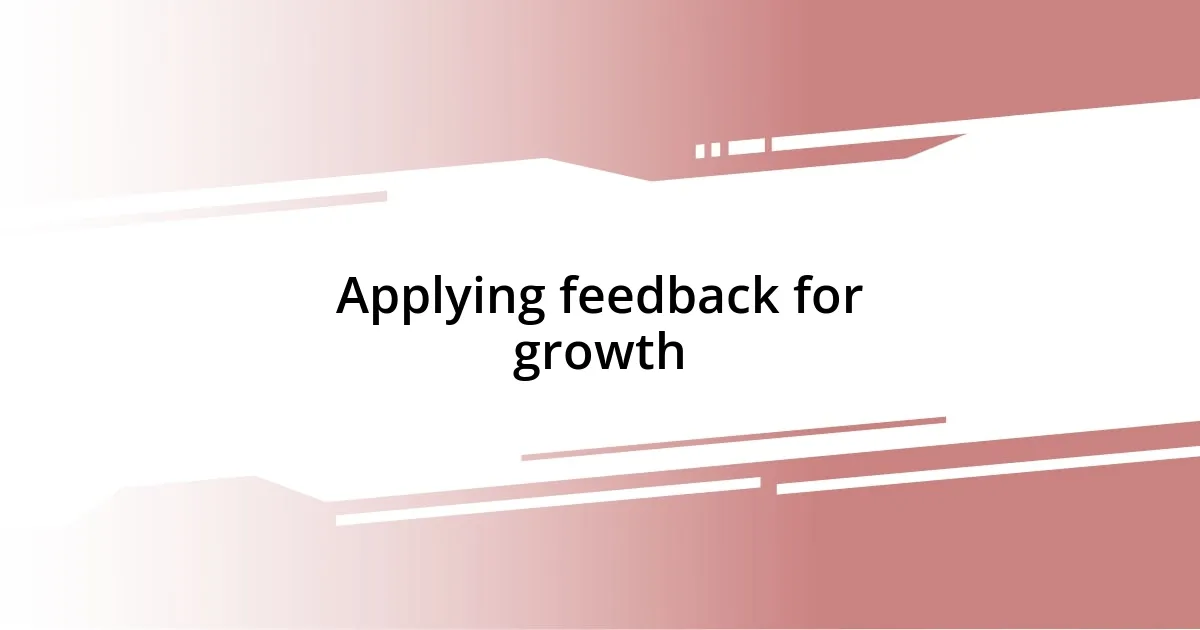
Applying feedback for growth
Applying feedback effectively can truly be a catalyst for growth. I remember a workshop where we shared our work in small groups. One peer pointed out that my thesis wasn’t as clear as I thought. Initially, I felt defensive; however, I took their comments to heart, reworking my argument into something more precise. Seeing that clarity reflected in my writing felt like a lightbulb moment. Why do we so often resist feedback when it can spark such significant improvement?
In another instance, I received feedback suggesting that I needed to strengthen my conclusions. I initially shrugged it off, thinking my final thoughts were sufficient. But, after sitting with it for a while, I decided to revise and integrate their advice. The result was a conclusion that not only summarized my work but also provoked new thoughts and questions in my readers. Has there ever been a moment when you overlooked feedback only to realize later its true value?
Finally, I learned that applying feedback doesn’t just refine our work; it also builds resilience. There was a time when constant critiques felt overwhelming, leading me to doubt my capabilities. Yet, I gradually learned to view each piece of feedback as an opportunity to grow stronger. The more I embraced this iterative process, the more confident I became in my abilities. Aren’t we all capable of transforming vulnerability into strength through the insights of others?









